
The Gospel of Mark is the second of the four canonical Gospels and one of the three synoptic Gospels. It tells of the ministry of Jesus from his baptism by John the Baptist to his death, the burial of his body, and the discovery of his empty tomb. It portrays Jesus as a teacher, an exorcist, a healer, and a miracle worker, though it does not mention a miraculous birth or divine pre-existence. Jesus refers to himself as the Son of Man. He is called the Son of God but keeps his messianic nature secret; even his disciples fail to understand him. All this is in keeping with the Christian interpretation of prophecy, which is believed to foretell the fate of the messiah as suffering servant.
The Hebrew Bible makes reference to a number of covenants with God (YHWH). These include the Noahic Covenant set out in Genesis 9, which is decreed between God and all living creatures, as well as a number of more specific covenants with Abraham, the whole Israelite people, the Israelite priesthood, and the Davidic lineage of kings. In form and terminology, these covenants echo the kinds of treaty agreements existing in the surrounding ancient world.
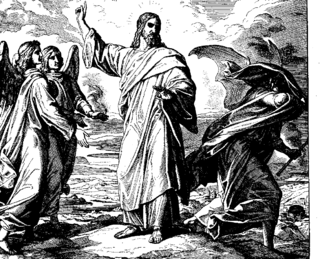
Matthew 4:10 is the tenth verse of the fourth chapter of the Gospel of Matthew in the New Testament. Jesus has rebuffed two earlier temptations by Satan. The devil has thus transported Jesus to the top of a great mountain and offered him control of the world to Jesus if he agrees to worship him. In this verse, Jesus rejects this temptation.

Matthew 5:8 is the eighth verse of the fifth chapter of the Gospel of Matthew in the New Testament. It is the sixth verse of the Sermon on the Mount, and also sixth of what are known as the Beatitudes.

Matthew 5:18 is the eighteenth verse of the fifth chapter of the Gospel of Matthew in the New Testament and is part of the Sermon on the Mount. In the previous verse, Jesus has stated that he came not to destroy the law, but fulfill it. In this verse, this claim is reinforced.

The Ten Commandments, or the Decalogue, are religious and ethical directives, structured as a covenant document, that, according to the Hebrew Bible, are given by YHWH to Moses. The text of the Ten Commandments was dynamic in ancient Israel and appears in three markedly distinct versions in the Bible: at Exodus 20:2–17, Deuteronomy 5:6–21, and the "Ritual Decalogue" of Exodus 34:11–26.

John 5 is the fifth chapter of the Gospel of John of the New Testament of the Christian Bible. It relates Jesus' healing and teaching in Jerusalem, and begins to evidence the hostility shown him by the Jewish authorities.

Matthew 5:38 is the thirty-eighth verse of the fifth chapter of the Gospel of Matthew in the New Testament and is part of the Sermon on the Mount. This verse begins the antithesis on the commandment: "Eye for an eye".

Matthew 28:19 is the nineteenth verse of the twenty-eighth chapter of the Gospel of Matthew in the New Testament. This verse is part of the Great Commission narrative, containing the command to go, teach and baptize new disciples with the trinitarian formula.

Matthew 23 is the twenty-third chapter in the Gospel of Matthew in the New Testament section of the Christian Bible, and consists almost entirely of the accusations of Jesus against the Pharisees. The chapter is also known as the Woes of the Pharisees or the "Seven Woes". In this chapter, Jesus accuses the Pharisees of hypocrisy. Some writers treat it as part of the fifth and final discourse of Matthew's gospel.

Matthew 26 is the 26th chapter of the Gospel of Matthew, part of the New Testament of the Christian Bible. This chapter covers the beginning of the Passion of Jesus narrative, which continues to Matthew 28; it contains the narratives of the Jewish leaders' plot to kill Jesus, Judas Iscariot's agreement to betray Jesus to Caiphas, the Last Supper with the Twelve Apostles and institution of the Eucharist, the Agony in the Garden of Gethsemane and the subsequent vindication of Jesus' predictions, of betrayal by one of the twelve Apostles, and that he will, in the Denial of Peter, be disowned by his closest follower, Saint Peter.

Matthew 17 is the seventeenth chapter in the Gospel of Matthew in the New Testament section of the Christian Bible. Jesus continues his final journey to Jerusalem ministering through Galilee. William Robertson Nicoll identifies "three impressive tableaux" in this chapter: the transfiguration, the epileptic boy and the temple tribute.
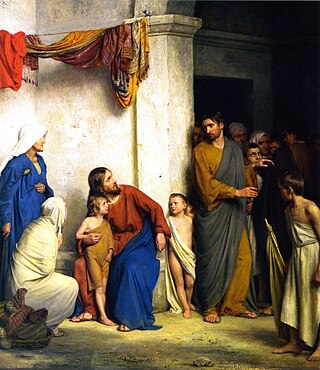
Chapter 18 of the Gospel of Matthew contains the fourth of the five Discourses of Matthew, also called the Discourse on the Church or the ecclesiastical discourse. It compares "the greatest in the Kingdom of Heaven" to a child, and also includes the parables of the lost sheep and the unforgiving servant, the second of which also refers to the Kingdom of Heaven. The general themes of the discourse are the anticipation of a future community of followers, and the role and "spiritual condition" of his apostles in leading it.

Matthew 22 is the twenty-second chapter in the Gospel of Matthew in the New Testament section of the Christian Bible. Jesus continues his final ministry in Jerusalem before his Passion. Teaching in the Temple, Jesus enters into debate successively with the Pharisees, allied with the Herodians, the Sadducees, and a lawyer, ultimately silencing them all.
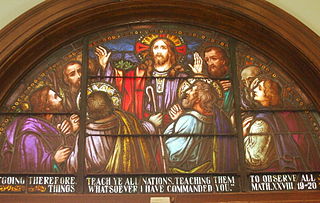
Matthew 28:18 is the eighteenth verse of the twenty-eighth chapter of the Gospel of Matthew in the New Testament. This verse is part of the Great Commission narrative, containing the emphatic declaration of Jesus' absolute authority over the universe.

Matthew 8:33 is the 33rd verse in the eighth chapter of the Gospel of Matthew in the New Testament.

"Finger of God" is a phrase used in the Torah, translated into the Christian Bible. In Exodus 8:16–20 it is used during the plagues of Egypt by Pharaoh's magicians. In Exodus 31:18 and Deuteronomy 9:10 it refers to the method by which the Ten Commandments were written on tablets of stone that were brought down from Mount Sinai by Moses.
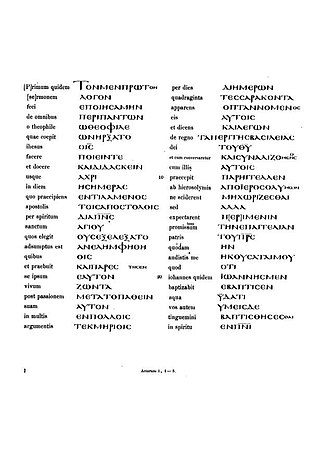
Acts 1 is the first chapter of the Acts of the Apostles in the New Testament of the Christian Bible. The book containing this chapter is anonymous, but early Christian tradition affirmed that Luke composed this book as well as the Gospel of Luke. This chapter functions as a transition from the "former account" with a narrative prelude, repeated record of the ascension of Jesus Christ with more detail and the meeting of Jesus' followers, until before Pentecost.
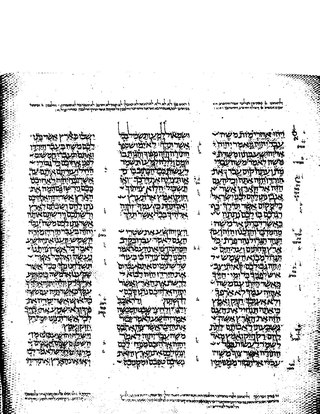
Joshua 1 is the first chapter of the Book of Joshua in the Hebrew Bible or in the Old Testament of the Christian Bible. According to Jewish tradition the book was attributed to Joshua, with additions by the high priests Eleazar and Phinehas, but modern scholars view it as part of the Deuteronomistic History, which spans the books of Deuteronomy to 2 Kings, attributed to nationalistic and devotedly Yahwistic writers during the time of the reformer Judean king Josiah in 7th century BCE. This chapter focuses on the commission of Joshua as the leader of Israel after the death of Moses, a part of a section comprising Joshua 1:1–5:12 about the entry to the land of Canaan.

Joshua 5 is the fifth chapter of the Book of Joshua in the Hebrew Bible or in the Old Testament of the Christian Bible. According to Jewish tradition, the book was attributed to Joshua, with additions by the high priests Eleazar and Phinehas, but modern scholars view it as part of the Deuteronomistic History, which spans the books of Deuteronomy to 2 Kings, attributed to nationalistic and devotedly Yahwistic writers during the time of the reformer Judean king Josiah in 7th century BCE. This chapter focuses on the circumcision and Passover of the Israelites after crossing the Jordan River under the leadership of Joshua, a part of a section comprising Joshua 1:1–5:12 about the entry to the land of Canaan, and the meeting of Joshua with the Commander of the Lord's army near

















